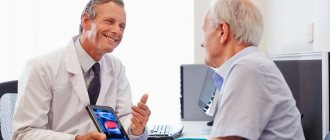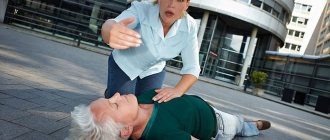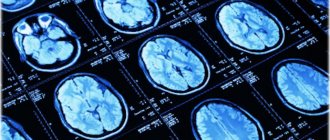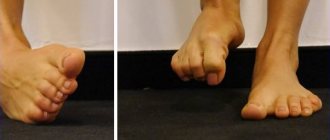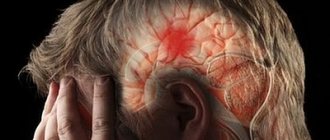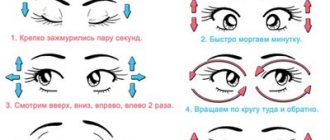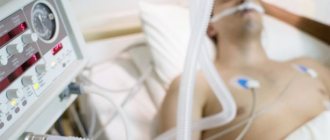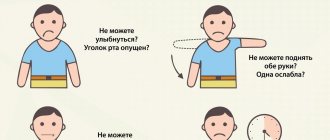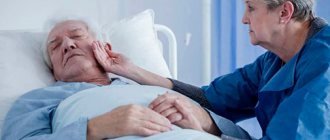10 minutes
A stroke is an acute disorder of cerebral circulation, leading to the destruction of brain tissue. Every year in Russia there are 450,000 cases of stroke - one every 1.5 minutes.
The causes of ischemic stroke can be atherosclerosis of cerebral vessels, coronary heart disease with cardiac arrhythmias, heart defects, osteochondrosis of the cervical spine, and arterial hypertension. With these diseases, obstruction or blockage of brain vessels develops, the blood supply to the brain is disrupted, which leads to bleeding of the brain - ischemia. If blood circulation in the ischemic area is not quickly restored, the brain tissue in it dies. The dead tissue then gradually dissolves to form cysts (holes) in the medulla.
The consequences of ischemic stroke are determined 90% by its severity and only 10% depend on treatment. Therefore, preventing stroke is many times more effective than treatment; Hippocrates said: “It is easier to prevent a disease than to treat it.”
Stroke prevention: simple rules for preventing stroke
What should you expect when you return home?
When you are discharged from the rehabilitation center, you will be given a discharge summary. It will cover all the necessary guidelines for caring for you at home, as well as the necessary equipment and supplies you may need. Returning home can be initially scary. You may not fully recover and will need to continue rehabilitation on an outpatient basis. You may also have many questions about how you can continue living a full life after a stroke.
Keywords
Some questions are answered, some problems are solved, some solutions are discarded. I read a lot, listened to a lot of smart and qualified advice. Not everything is suitable. It’s as if they gave you a huge bunch of keys, and one by one you insert them into the keyholes. Some refuse to turn, while others - with a certain amount of patience - open the lock. Over the course of a year, we acquired a whole set of such keys, making the recovery process easier, faster and more efficient. Solutions to specific problems—like the problems themselves—are different for everyone. But the keywords, I hope, are general. I made a small list for myself.
Fatigue
Fatigue is one of the most common symptoms of stroke. This symptom affects most people who have had a stroke, regardless of its severity, and is usually most noticeable when they return home from the hospital.
This type of fatigue is different from the usual and usual fatigue for us, and it does not depend on your activity or activity. Each of us sometimes feels tired, but this feeling often goes away after rest. However, after a stroke, the fatigue you feel may make you feel like you don't have the energy to do anything. Often you may feel that the feeling of fatigue comes completely unexpectedly and at this moment the only thing you can do is rest until this feeling passes.
Sometimes it takes months or even years for this symptom to go away. Many people after a stroke say they have good days and bad days - days when they feel they can do more things and days when they need to rest more because they feel tired. During the recovery process, good days tend to increase and bad days decrease. Often this fatigue is invisible to other people, so it can be difficult for them to understand what you are feeling. Despite this, you can help yourself in various ways. The key to success is to realize that it is not your fault and it is not your fault. You need to accept the fact that it takes a long time to overcome this symptom of fatigue.
Stealth
Home rehabilitation should be unnoticeable and joyful, like fresh air. There are two ways to do this: habit and integration. Having gotten used to morning exercises (there are several of them: for the eyes, for the arms and legs, for articulation, for diction), the husband seemed to stop noticing them: the process fit into the daily routine as naturally as, for example, brushing teeth and breakfast.
The most difficult thing is exercise therapy. My husband, who has been training in weight training equipment for several years under the strict guidance of his relatives, has a strong aversion to gymnastics. In the summer, a handsome jokester instructor from the rehabilitation center for the disabled, an exercise therapy instructor, came to our house. While talking about life and politics, they easily and imperceptibly completed a half-hour complex, but alone... We can’t do anything without an instructor, to be honest. So, willy-nilly, we introduce physical education into life: we walk a lot, we prefer to buy groceries in more distant stores, we take the elevator not to the 13th floor, but to the 11th floor, etc.
This is integration, when “rehabilitation activities” are dissolved in daily life and work. There is room for imagination here! Peeling potatoes or typing exercises on the keyboard with 10 fingers - fine motor skills, proofreading texts - an exercise in attention, writing them or translating them from English - speech development. After watching a movie together, the next day we remember its content.
Much better than telling stories based on pictures, which the speech therapist strongly recommends. “Well, this is for those who are completely,” the husband responded politically incorrectly about such a proposal. Of course he's bored. He is a creative person, he composes a parody for each film, interpreting the events in his own way. And I ask boring questions: what did the main character do, what was the name of his girlfriend, how many friends came to visit them.
Daily routine
A daily home routine can be helpful. Your day will be less monotonous and this will allow you to learn to listen to yourself and determine when you feel active and do some housework accordingly. The daily routine is based on your needs and the needs of your loved ones. Think about what chores you need to do every day, what you can do on your own, what you need help with, and what you will need to learn to do again. Think about how much time you will need to complete all this work. If you feel yourself getting tired, try to perform the most difficult and tiring tasks that require more energy during the day or week when you feel more energized, making sure to take time to rest. It is very important to be as active as possible. Try to continue your hobbies, social activities and other activities as much as possible. And if you can, try to breathe fresh air every day!
Responsibility
Letting go of the reins is not easy. Not so long ago, we went everywhere together: to doctors, to government services, to a medical examination... And then it was time to get a foreign passport, and I decided to stay at home, pretending that nothing special was happening. The husband was at first taken aback by surprise, but also did not show it and went to the Federal Migration Service. It was necessary to go on foot, in winter, quite far, then navigate through a pile of papers, a crowd of irritated people, etc. Of course, in fact, we were both nervous, but everything worked out, the passport was received quickly, and we went to the coveted sea, which in itself is an inexhaustible source of rehabilitation discoveries.
Now the husband decides his own affairs: he monitors documents, numbers, makes appointments with doctors, makes copies of certificates, calls authorities on the phone, not embarrassed by his own imperfect diction.
It seems that this is surprising for an adult - it’s a simple matter. Tricky - if for several years your codependent loved ones have actively and lovingly endowed you with disabled thinking. It is, in fact, convenient for both parties. The disabled person is freed from any responsibility; his loved ones, on the contrary, feel complete control over his life. Everyone is happy, but for some reason life goes awry, in the other direction: an adult and smart man, without becoming dumber, day by day he becomes more and more like a child, wallowing in his own learned helplessness.
Yesterday he was getting ready to go to the hospital, and I was lying on the sofa and reading a book, burning with the desire to get up and quickly (and correctly!) pack my bag. She didn’t do anything, she just helped her find a small teapot, which she had put somewhere. If you forgot something, he’ll take it when you come on leave on the weekend. If he is in danger of dying without the forgotten item, I will bring it. However, so far, as far as I can tell, only the comb has been forgotten. Not fatal.
Stay active and keep in touch with friends and acquaintances
Many people feel weak, have difficulty speaking, or have any other problems after a stroke. This leads to them losing interest in the outside world and not wanting to communicate with friends and acquaintances. An important step in rehabilitation after a stroke is socialization. You may find it difficult to go to places you used to go to before your stroke because of your mobility problems, or you may be worried that you will not be able to cope with your problems outside the home. You may find it easier to stay home, but this can lead to isolation, loneliness and low mood. There is always a solution to problems, you can take the help of others or use a stroller to move around. Try to keep in touch with your close friends, invite them to visit or travel with them. It will help if your friends know your capabilities, what you can and cannot do. Meeting new people may be intimidating at first, but it is likely that meeting new people can be especially beneficial for you. Often people make new friends with people who have also had a stroke, and this helps them share their experiences. A positive mood, an active life and maintaining relationships with friends and acquaintances are the key to your recovery.
Medical examination
If a stroke is suspected, specialists from any ambulance and emergency team conduct an examination, identify characteristic symptoms, measure blood pressure, and conduct an ECG with a portable device. The patient is administered the necessary medications and immediately transported to a specialized hospital.
In the hospital, a clarifying examination is carried out, the patient is promptly examined again, placed in the intensive care unit, treatment is started and an examination is prescribed.
Remember: only a specialized vascular center can correctly diagnose a stroke and help. The patient should be immediately taken to a hospital that is part of the unified Moscow system of emergency vascular centers. Do not waste time and do not self-medicate. The life of your loved one may depend on how quickly you act.
Emotional state after a stroke
You will need time to understand what is happening to you, and understanding this is an important step in your recovery. It is important to remember that recovery and recovery time varies from patient to patient.
Try to share your feelings and sensations with people you trust. People often experience a variety of feelings after a stroke, such as:
- Fears and concerns are a natural shock, mistrust and feelings of loss can affect you and your family. You may be worried about partial memory loss or may be afraid of having another stroke.
- Anger and frustration – You may be angry about something that happened to you or you may be frustrated that you can't do the things you used to do, especially if you have difficulty speaking. Sometimes you may be irritated by other people around you, you may have changes in mood, this is something that can affect you and your family.
- Depression and Anxiety – You will probably experience feelings of anxiety and worry and this is quite normal. Depression is a natural process that occurs after a stroke, so if you are often depressed, you may want to talk to your doctor and start taking antidepressants.
- Tension in relationships – irritability and increased emotional state can lead to tension in relationships with people who are close to you. You may find yourself directing your anger, anger, and frustration towards those close to you. Remember that your family and your friends are trying to understand you and how you feel.
- Loss of self-confidence – Feelings of self-doubt and low self-esteem are common after a stroke, but you should focus on becoming as independent as possible and should take as many opportunities as possible to improve your self-esteem. Making the right decisions about how to care for you, learning new skills, and setting realistic, achievable goals can help you do this.
- Lack of incentive – Recovery from a stroke usually occurs gradually with small but important goals and achievements. If you feel tired and in a low mood, this can affect your motivation to heal and recover. You can set small and achievable goals, and this may feel strange at first, but it will help you stay in a good mood and help you stay motivated and eager to recover. It is vital to stay in a good mood. Remember that it is quite normal if everything works out for you one day, but not the next. There are limits to what you can achieve and do!
When to start recovery after ischemic stroke injury
With such an illness, the patient must immediately go to the hospital to receive professional emergency care, followed by reliable treatment and elimination of the root causes of its manifestation.
The average hospital stay is 2-3 weeks if there are no complications. This period is enough to collect all the tests, identify the characteristics of the situation and drug treatment. But it is recommended to start professional rehabilitation from the first day after an apoplexy strike while still in the hospital under the supervision of doctors . This way you will restore lost speech, memory, etc. as reliably as possible.
Remember, the faster you begin to normalize your condition, the higher the likelihood of obtaining the most favorable prognosis for recovery, and the risk of relapse of an attack will also be reduced. It also allows you to more reliably and safely cope with various secondary diseases that appear after an attack.
Relationship
A stroke does not only affect you, but also those around you. Your relationships with others may become difficult and may be affected by how you feel. Your family and friends will try to understand how you feel and you should be honest with them. By telling them about your feelings and trying to understand what they feel, you can help yourself. Adapting to life after a stroke will lead to some changes in your life and in the life of your spouse, and this can then lead to stress in your relationship. Emotional changes, changes in your body and difficulties in relationships can also affect your sex life.
What are the first signs and symptoms of a stroke to look out for?
In some patients, the attack manifests itself clearly: they fall and lose consciousness. But it also happens that the signs are not clearly expressed, and it is difficult to recognize a catastrophe in the blood vessels of the brain. A person may think that another disease is simply manifesting itself so strongly, for example, a hypertensive crisis, especially if the patient suffers from arterial hypertension.
Characteristic signs of stroke in men and women:
- Headache. It is quite strong, often accompanied by dizziness, nausea, and vomiting.
- Paralysis and numbness in different parts of the body. The problems can occur in one arm, leg, face, or entire half of the body. They are expressed to varying degrees, depending on which part of the brain is damaged and how severely.
- Speech impairment. The patient has difficulty pronouncing words and phrases, or has problems understanding someone else’s speech.
- Visual impairment. Double vision may occur, dark spots and “spots” appear before the eyes.
- Loss of coordination of movements, sense of balance, severe dizziness.
Even if the symptoms that a person has do not clearly indicate a stroke, but there is at least the slightest suspicion, you should immediately seek medical help. Better to play it safe. Call the hotline of the Moscow Emergency and Emergency Service for subsequent hospitalization at the territorial vascular center.
Driving
A stroke can affect your ability to drive safely in a variety of ways, such as your physical condition, visual impairment, or difficulty concentrating for long periods of time. In the first months, even after a mini-stroke, you are not allowed to drive. After some months, you will need to visit your doctor, who will give you advice and recommendations regarding driving and will tell you whether you can start driving again. They will likely refer you to have your driving abilities reassessed. It is important to tell your insurance company that you have had a stroke.
Five minutes
It's no secret that the majority of disabled people (like all of us, for that matter) spend almost all their time on the Internet. A rule that has long been forgotten by everyone: every half hour of working at the computer you need to take a break. It seems like a small thing, but try to force yourself! For example, I fall off the monitor only when my eyes stop showing and my brain stops thinking. Now I feel better. I'm not alone. For a short distraction, we have separate “menu” items – activities that take 5-10 minutes.
We play ball (if it’s difficult to throw a ball, a tied scarf, for example, is perfect, it flies slower and is easier to catch), we dance, sing songs, lay out small objects on the table, remember their location, and then the one who drives changes something here and there. I already wrote about dancing last time - it’s much simpler than it seems. There were difficulties with singing. It turns out that most of the songs are very fast. I have recorded a huge number of karaoke collections; Only a few songs turned out to be suitable for our family duet, mainly Russian folk and Cossack songs. So we sing without words, howling with some single sound, which is terribly fun - I recommend everyone to try it. And we are still tormenting the guitar, trying to achieve a more or less passable performance of one English-language song. But here everything is ahead.
Returning to work
A stroke will be a real challenge for you if you have previously worked. It can leave a big imprint on your life and change your role in the family and society. Many people do not look at the situation realistically and try to do many things in a short period of time. Fatigue, cognitive complications such as memory loss, and difficulty concentrating may mean you will not be able to return to work. It is important to have an honest conversation with your employer so that you can consider on-the-job adaptation. Part-time work and a reduced workload may be a viable option. Don't be too hard on yourself if things don't work out or aren't going as well as they did before you had your stroke. A lot of people are returning to work. Many see this as an opportunity to try something new, such as working from home or taking on new responsibilities.
"Learned helplessness"
I diligently get used to the role of a helpless and weak woman, although I am used to being completely different. I began to like being capricious and, lying on the sofa, asking my husband to bring me a cup of tea or run to the stall for a migraine chocolate and a packet of cream. In stores I don’t check receipts, leaving it to him to do it (an excellent exercise for attention, but I’ve always been bad at arithmetic), in a bank I don’t communicate with terminals or with real people, in a store I talk to the seller only if I’m buying something for myself, but I bombard my husband with questions: “Which color is better? Is this size better or that one? Don’t you think that blouse with ruffles and huge flowers suits me better?” Ugly, nasty wife? Undoubtedly. But I had to learn all the above tricks by overcoming myself.
Next to me like this - eccentric, spoiled, helpless - my husband will feel like a strong man; a capricious little girl has a much greater rehabilitation potential than a woman who stops galloping horses. The same applies to those suffering from chemical dependency. How many times have I heard stories about how a person first thought about getting rid of passion only when his loved ones let go of the reins and he had to do something himself, when the situation forced him to take care of his loved ones and helped him feel strong and responsible.
REDUCING THE CHANCE OF REPEATED STROKE
Is there a risk of another stroke?
If you have had a stroke, you are at risk of having another stroke. However, there are several things that can reduce the risk of a second stroke:
- Taking the medications you have been prescribed
- Control and maintain blood pressure within normal limits
- Control and maintain blood cholesterol levels within normal limits
- Diabetes control (if necessary)
- Adapting to a new way of life to reduce danger
Changes in your life may include:
- Stop smoking
- Healthy and varied diet
- Maintaining a Healthy Weight
- Staying physically active
- Reducing alcohol consumption
Diary
My husband is lucky: he is a journalist by profession and writing texts remains his favorite job. Regular posts on LiveJournal or Facebook are also part of rehabilitation. Reading Denis’s blog, you can see how a person changes: starting from deathly silence for a year and a half after a stroke, through a series of gloomy short opuses - to optimistic and often socially charged texts of recent years, full of humor and reflections on faith. Three years ago I asked him to write at least three lines a day - about anything, even about a nail in a hospital wall or the rain outside the window, just so as not to remain silent. Today is a rare day that goes by without fasting.
The speech therapist advised him to keep a special rehabilitation diary, recording daily activities and the successes achieved. At first, my husband was skeptical about this idea, but in the summer at sea he suddenly discovered that he could jump. For more than five years, this seemed impossible to him: “like, for example, by an effort of thought, transfer yourself from the 1st floor to the 13th,” he explained. And then suddenly I tried it - and it worked. We immediately bought a notebook and wrote down our joy there, now a diary lives in it. It also needs to be written by hand - here’s another exercise.
Leisure
In the absence of a TV, we spend our evenings in the old-fashioned way - playing quiet games. It turns out that there are many ways to while away your leisure time with rehabilitation benefits. For example, to develop attention, you can play lotto; “Monopoly” (and any board games with chips) also develops fine motor skills and, a little, memory. A wonderful thing is special paired cards for memory development. You play them, like solitaire, face down, and, opening one at a time, try to remember the location. The great thing is that most often I lose here, and this exercise puts not only my husband in the position of a learner, but also me. By the way, we are already aces in this game, we play with two decks! The third one is waiting in line.
Remember, at school, in order to while away boring lessons, we took turns writing words on long pieces of paper, making up a coherent story from them. The most difficult thing was to read the resulting masterpiece and not be thrown out of class for breaking the silence with terrible laughter. Our teachers didn’t understand anything: this activity could be a wonderful exercise, but it had to be done without a piece of paper, stringing words together from memory. When we’ve finished laughing, I quietly write down the resulting outlandish story (“The evil peacock sat on the edge of a terry stool and thought about the blue pear he dreamed about”), and a few hours later I ask my husband to remember.
Another fun game: put arbitrary pairs of words into coherent phrases, and after a while, using the first word, remember which word was the second in the pair. Moreover, both my husband and I strain our memory. So the exercise ceases to look like an exercise - and this, in my opinion, is one of the main requirements for it when it comes to the rehabilitation and social adaptation of an adult.
